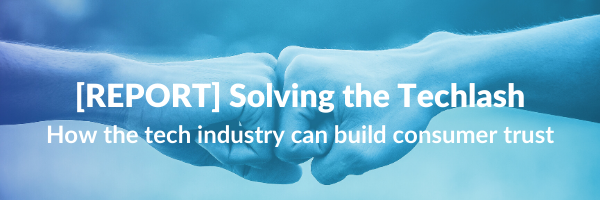Media relations should build your audience's confidence in your brand
We help prepare our clients for interviews with reporters nearly every day, and in my experience, no topic creates more anxiety in a tech executive than cybersecurity or privacy.
Security and privacy are no longer the hot-button, crisis-driven topics they were once perceived to be. Consumers are increasingly savvy about the products and services they use, and they expect transparency and clarity regarding data privacy and protection from the companies that make them.
Moving forward, these topics should be welcome opportunities to build trust between customers and the tech industry. By showing that they care about growing consumer concerns, tech executives can demonstrate leadership, align with societal values, and create a point of differentiation among competitors.
Emerging technologies such as IoT, drones, connected homes, autonomous vehicles, and artificial intelligence are light years ahead of regulations. The rules are non-existent, which presents a challenge for companies innovating in uncharted territory.
These companies must be responsible not only for developing new and exciting products, but also understanding the potential impact of these technologies and approaching them in a cautious, practical, and responsible manner.
The same organizations marketing these technologies are often responsible for educating lawmakers and the industry on the issues to be considered. So, how can technology companies build trust through their interactions with the press on topics of security and privacy?
- Don’t shy away from talking about security and privacy. Embrace the discussion as an opportunity to build trust with reporters and customers.
- Be specific. Nothing provokes more suspicion than saying “trust us.” It’s not enough to tell a reporter that you’ve got it covered. Demonstrate how and why your customers and the public should trust you. You don’t need to spill all your secrets, but you do need to provide some basic details and substantiate your claims.
- Be realistic. Perfection would be nice, but it’s practically impossible. Recognize that something will eventually go wrong. When an issue does arise, it’s best to address it head-on, clearly communicate the changes that are underway, fix it quickly, and explain what you’ve done to prevent similar circumstances in the future.
- Don’t fight the regulation movement. Take a position and be prepared to explain and rationalize it.
- Take the time to educate journalists. And not just the ones who cover your company.
In an age where data privacy touches everyone’s lives, it’s crucial that organizations adopt a position of responsibility and transparency as they communicate with their audiences. Remember that media interviews serve as an excellent opportunity to lay a strong foundation with your customers and demonstrate the importance of these values within your company.
Airfoil Group has proven success in preparing clients to confidently navigate media opportunities. Looking to become more interview-savvy? Connect with us today to start enhancing your media relations strategy.





